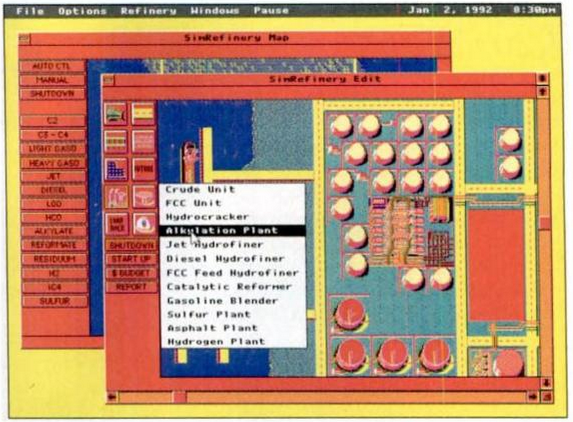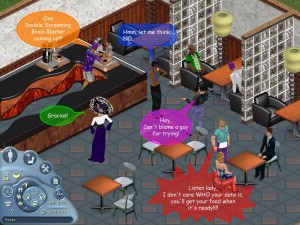Farewell, Maxis: a look back and some Sim obscurities 

Last week we got the very sad news that legendary developer Maxis closed its doors after 28 years. The Maxis name and its related brands will live on for years under new stewardship, but the end of the original Maxis studio is a great symbolic loss. The company is rightfully most loved for SimCity and The Sims, two games that pushed the medium in exciting, unexplored directions. Those titles twice redefined the simulation genre and exposed gaming to millions who might not consider themselves the right audience. If Maxis’s contributions stopped there, they would still sit among the titans in gaming history.
But Maxis’s secret weapon (and the reason I’m mentioning them here) was their steady output of stranger, lesser-known stuff. Outside of their most notable franchises, Maxis released roughly a dozen other Sim games and served as publisher for many independent titles. They somehow made compelling experiences out of ant lifecycles, farm management, and hotel development, and they tackled simulations of such ambitious scope that they had to be named SimLife and SimEarth. The studio also invested in similarly spirited one-off oddities like Widget Workshop, an experiment-driven edutainment sandbox program. Maxis’s milieu (so to speak) proved that games could go anywhere and be anything – for everyone. Their signature blend of approachable design and endless depth ensured that anyone could have unexpected fun. Almost no one else has mastered that balance.
Of course, Maxis excelled at the little things, like sensible interface design and clear, friendly graphics. At the same time, they tackled huge, insane ideas. Consider their experiment with SimCopter, a flight simulator that meshed with content from SimCity 2000, maybe the first game of its kind to meld content from multiple titles. Sometimes this ambition didn’t quite work, as arguably happened with Spore. But they shot high and weird, and they deserve ultimate respect for that.
To celebrate Maxis and their more obscure output, I want to look at the craziest Maxis games that you can’t play, whether because of cancellation, discontinuation, or rarity. Maxis was prolific, and their footnotes are as fascinating as their successes.
SimMars
According to a preview from IGN, SimMars cast players as the first group of settlers on Mars, tasked with mining and terraforming a realistic version of the red planet. As the game progressed, day-to-day survival strategies would give way to larger colony management. The slow ramp-up from individual responsibility to planet-wide management borrows pieces from almost every other game in Maxis’s stable, effectively serving as the last word in the Sim series in the way that the similarly all-encompassing Spore intended.
It was in fact the last word for Sim games, though only because it marked the end of the series. The game was canned shortly after the release of The Sims, signaling Maxis’s new direction and focus. Maxis never produced another Sim game. It may have been for the best that the company opted for fresh ideas and audiences of The Sims, but SimMars is a giant could-have-been from Maxis’s history.
Few details of SimMars remain apart from the trailer (above) included with some copies of SimCity 3000.
SimRefinery

Scanned screenshot from SimRefinery. From the PC Magazine article “Businesses Play War Games” by Christopher Barr, June 15, 1993, 31. Via the Internet Archive’s American Libraries collection
Maxis erred silly, though they produced realistic games too, like the politically charged SimHealth. At one point, they even made a simulation for hire. As Will Wright tells it to Wired:
In the first couple months after SimCity appeared, we were approached by a number of companies saying, “Hey that’s great! If you can do a city like that, we want you to do “SimPizzaHut,” or “SimWhatever.” We thought these things were so weird that we said no, but they kept coming in. So at some point, as we got big enough, we decided to give it a go. Our first one was a prototype for Chevron. It was SimRefinery – a simulation of their refinery operation, for orienting people in the company as to how a refinery works. It wasn’t so much for the engineers as it was for the accountants and managers who walked through this refinery every day and didn’t know what these pipes were carrying.
SimRefinery was never released beyond its limited distribution at Chevron. No playable copy will likely ever be found. (UPDATE: A copy of SimRefinery was recovered!)
The Sims Online
The immense popularity of The Sims demanded a follow-up, and its expandable neighborhoods pointed to multiplayer as the next logical step. Maxis and Electronic Arts aped the successful model of online role-playing games with The Sims Online, a persistent world where you could make a Sim, buy a house, hang out with friends, and play around in a massive virtual country filled with other Sims fans. The pairing of the personal expression-driven Sims franchise and personal expression in online game characters makes perfect sense, and the game should have worked.
Unfortunately, from my experiences, the in-game economy incentivized the wrong activities. In the Sims games, your Sims leave during the day to work for a paycheck, but this doesn’t translate very well to an MMO. Instead, you got money by assigning your Sim to tasks that required group participation or were dependent on your Sim’s skill level. Practically, this devolved the game into a constant grind. Almost every house in the world was, at least from what I saw with brief time in The Sims Online, just a field of workout machines and pizza-making stations where players would frantically earn money and skill points. Once you had enough cash, you could make your dream home… but the only sensible way to draw visitors to your house was to build more workout machines and pizza stations. Thus the cycle continued. A study at UCLA cited a review that called a typical house in The Sims Online “a labor camp in which other Sims will come to earn money.” For-fun venues like casinos and romantic getaways were non-existent.
The Sims Online is one of Maxis’s bigger letdowns. Given their reputation for understanding system dynamics, it’s surprising that they couldn’t address the game’s imbalances.
Still, it had active players who remember it fondly, and its communal work interactions anticipated the sort of social games that are popular today – including the recently canceled The Sims Social. The game lasted for five years before being rebranded as EA-Land and closing shortly after.
Though The Sims Online went dark seven years ago, a dedicated group of fans are attempting to create their own servers to keep the game running. The emulator, known as Project Dollhouse, appears to be in active (if glacial) development and currently has some basic debug features implemented. [UPDATE: More recently, FreeSO has made big advances!]
SimsVille
SimsVille was Maxis’s first attempt at bridging the worlds of SimCity and The Sims. Maxis’s Dan Hopkins explains it pretty well in the video above: “You don’t really go inside and see the interiors of their homes. It’s not really about managing their day-to-day activity. It’s more about this community that you create.” The game focused on your neighborhood, individual people, and how they influence each other, though you could zoom down to the level of individual Sims and watch them go about their business. This is a similar structure to SimTown, the smaller kid-friendly SimCity spinoff.
Sims, houses, and so forth were supposed to be imported from your The Sims save files. Again, as with SimCopter and Streets of SimCity, Maxis kept pushing to merge their games into something greater.
This could have been a really radical game, and with its focus on both macro- and micro-level management, it’s Maxis at their most Maxis-y. But early demos of the game weren’t well received, and Maxis axed the project after deciding it didn’t meet their quality standards. Many of its elements, like interactive neighborhoods and public gathering spaces, were incorporated into later Sims games and expansions.
These are certainly Maxis’s deepest cuts, but their whole less-celebrated oeuvre deserves a parting salute. All those non-starters like SimsVille echo the company’s commitment to boundary-pushing experiences that anyone could play. Maxis might be gone in all but name, but their love for the weird and the bold – even when no one was playing – will live on.



I think Sime Isle was a great concept, it was the economics that made it difficult and challenging. Maintanence was a big factor in making money from hotels. But cities and mining and logginger were fun. It was a nice sim. But Sim Farm was one of the best farming sims I have ever played. I am disapointed that they never made sequals to theses great games. Sim Mars was canned and it is plain to see that the sims was a spin off that may not have been true to the fan base of sim games. I regret not every playing sim mars. The closest thing to it may well be the mars simulation project. And enven then it is a game that is not as user friendly to the Maxis sim games. I think Anno 2205 may be the right game to pass on the crown to sim gaming as it seems to give a fun gameplay with great ideas. I liked anno 2070 but the steam aspect was a hurtle to cross over that was saved with an offline mode. Still I hope many great simulation games are made by companies with great and new innovative ideas.
I love these more obscure Maxis titles. My friends and I played loads of widget workshop as a kid, it was a fun game and I didn’t realize it but also a good intro to math, logic, and programming.
We also loved Streets of Sim City which seems nearly forgotten. Like SimCopter, you made cities in SimCity 2000 or the editor tool SCURK. Then you could drive around in your car which you could upgrade mad max style with guns, rocket launchers, armor etc. There were a few different modes like race, package delivery, bounty hunting, and free-for-all as I recall. You could destroy buildings with your rocket launcher. And there were two expensive upgrades you could get that would basically allow you to build a flying car. It was definitely not a typical Maxis game, seemed to have no educational value but it was stupid fun.
We also played TSO beta and a bit of the commerical release but I got to addicted and had to stop. There was all kind of nasty stuff you could do in that game if you wanted to troll, like slap someone and steal the gnome they just finished making and sell it. Also I remember one time I found a brothel where people would offer to cyber for money. It was just as twisted as the single-player sims game could get sometimes, I suppose, lol. I agree the incentive structure in that game was super weird. It’s always sad when virtual worlds close. I heard a great podcast episode (I think it was A Life Well Wasted maybe) where they had a recording of when TSO was shut down. Games are getting so much harder to preserve…
I would have loved to try SimPizzaHut.
Wow, imagine SimAmazon…!